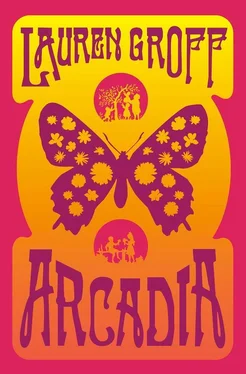Lauren Groff - Arcadia
Здесь есть возможность читать онлайн «Lauren Groff - Arcadia» весь текст электронной книги совершенно бесплатно (целиком полную версию без сокращений). В некоторых случаях можно слушать аудио, скачать через торрент в формате fb2 и присутствует краткое содержание. Год выпуска: 2012, Издательство: Hachette Books, Жанр: Современная проза, на английском языке. Описание произведения, (предисловие) а так же отзывы посетителей доступны на портале библиотеки ЛибКат.
- Название:Arcadia
- Автор:
- Издательство:Hachette Books
- Жанр:
- Год:2012
- ISBN:нет данных
- Рейтинг книги:3 / 5. Голосов: 1
-
Избранное:Добавить в избранное
- Отзывы:
-
Ваша оценка:
- 60
- 1
- 2
- 3
- 4
- 5
Arcadia: краткое содержание, описание и аннотация
Предлагаем к чтению аннотацию, описание, краткое содержание или предисловие (зависит от того, что написал сам автор книги «Arcadia»). Если вы не нашли необходимую информацию о книге — напишите в комментариях, мы постараемся отыскать её.
Arcadia — читать онлайн бесплатно полную книгу (весь текст) целиком
Ниже представлен текст книги, разбитый по страницам. Система сохранения места последней прочитанной страницы, позволяет с удобством читать онлайн бесплатно книгу «Arcadia», без необходимости каждый раз заново искать на чём Вы остановились. Поставьте закладку, и сможете в любой момент перейти на страницу, на которой закончили чтение.
Интервал:
Закладка:
Ike’s number was still in the ancient pleather phone book: poor Ike, dead these twenty years, who, like his sister, had grown into beauty in his midteens. Who loved his new adult body, used it indiscriminately, with gorgeous Norwegian women who knitted him sweaters, men in the park at night. By the time he finally admitted he was sick, he had lesions. It didn’t take much for him to die. A breath of cold air, pneumonia, one weekend in a hospital, and Bit arriving too late with flowers, finding a bed still warm under the imprint of Ike’s body. Those were the years when Helle’s family rarely knew where she was or how to get in touch with her. She didn’t know to come to Ike’s memorial. This broke her heart, even twenty years later, made her cry and cry when the shame of her life swallowed her down.
He called Leif, who answered coldly. Couldn’t talk. In editing. Hadn’t heard from his sister. Wait until morning then file a police report. Get back to him after Bit calls the cops. Earlier’s better than later. Dial tone.
It was midnight when he called Hannah, who had just begun living apart from Abe. He’d watched, alarmed, as Hannah suddenly became a fury of a woman, a new Hannah, a shouting one. When his mother answered her phone, Bit heard the desert behind her, the coyote howl and insect hum; could almost feel the wall of heat rise up against him, almost see the grasping saguaros. She was teaching history at a university there, and was still so full of anger at Abe that she couldn’t say his name. Your father, she called him. I haven’t heard anything from Helle, she’d said that night. Call your father .
Although Bit was on Hannah’s side (always on Hannah’s side; poor Abe), the richness of his mother’s fury took him aback. Her rage seemed immoderate in light of Abe’s sins. Bit could understand how she’d be upset: Abe had used their life savings to build a house in the Arcadia Sugarbush, throwing away all those years of scrimping, telling her they were poor again only when their new house was mostly built. Worse, Abe was officially squatting: Leif’s corporation, Erewhon Illuminations, now rented the old Homeplace from Handy. Leif had been a puppeteer, then went into movies and, when he’d tired of shoving his hand up felted asses, had gone on to computer-generated films. His last one was a retelling of the old Scottish ballad “The Well of the World’s End.” It was nightmarish, shockingly beautiful. The landscape was pure Arcadia. The company’s ranch in California had proved too small and Handy still held the title to Arcadia and always needed money, so Leif took over. What had been the Free People’s was now a corporation’s; sacrilege! The diaspora of Arcadia had rebelled. Squatters had descended, ponytailed men with tents so old the sides shivered apart in a small wind, women with rears gone soft as brioches. Most wandered home soon, but four stayed to build houses. Midge dug into the hill on the side of the Sugarbush, a geothermally controlled cabin, her own Hobbit hole. Titus and Saucy Sally and their kids built a treehouse. Scott and Lisa, hiding their anarchic hearts under Brooks Brothers sweaters, built a Mission-style cabin overlooking the Pond. And Abe, old engineer, had poured his whole being into his house. He had become obsessed with what would happen in the end of the era of oil and went offgrid, solar everything, backup windmill; rainwater catchment system, backup well; ambient solar heating, backup woodstove; materials eighty percent salvaged. Even the insulation was shredded dollar bills from Fort Knox.
When Bit called his father the night after Helle disappeared, he imagined the dark lonely Sugarbush, the forest pressing in on the old man. Abe picked up, panicked. What’s wrong? he said. When Bit explained, his father went silent. At last he said, Helle was so troubled, honey.
I know how troubled Helle is, snapped Bit. She’s been fine for four years.
Abe said nothing. Bit hung up, hard.
Bit wanted to weep with frustration. He heard a mouselike noise and looked up to find Grete, pale in the door, her stuffed frog in her arms. I can’t sleep, she said. Mommy needs to come.
Bit said, Can I try?
Grete said, No. It’s Mommy.
Mommy’s on a walk, said Bit. Why don’t I tell you a story? And she was too tired to resist, and he sat with her then the way he has sat with her every night since that first one, waiting until her breath evened out into sleep, into the morning, wondering how in the world he was going to protect her now.
He reads Sylvie’s paper about her digital fast three times before he puts it down. She has a tight, tiny script and uses the whole page. She describes how lonely she first felt when she put away her digital things, how cut off from the life she knew. She panicked a little, thinking about what would happen if her father had a heart attack or if a professor sent out an important e-mail, and to escape the anxiety, she went for a long walk. It was strange to walk outside without music in her ears. The city seemed so loud, and now that she could hear its regular noises, she could sense other things, too, the smell of the pretzels from the cart, the deep blue color in the folds of the steam from a grate. She sat for a long time in a park and watched the iridescent throats of pigeons. It seemed miraculous, this glorious color in such filthy birds. The people sped by, and she noticed how naked their faces were, as if they had become so used to nobody looking at them that they allowed themselves to be seen again. She was cold because she had watched for so long. To warm up she went to the Film Forum; they were playing movies from the forties. It was strange to be going into a theater on a bright cold day, and she kept itching to check her e-mail or text messages, feeling awkward because she was alone. But she bought a huge tub of popcorn and sat there, and after the first movie, began enjoying herself enormously. It was like taking a vacation from her life. Then a man sat down next to her. He was good-looking, salt-and-pepper. There was something about the almost-empty old theater with its velvet and gilding, the hot butter on her hands, the emotional sweep of the movies above, the man’s handsome profile, his smell of soap and shaving cream, that seemed glamorous and filled her with tension. She stopped seeing the movie, waiting for the man beside her to touch her, not knowing if she was going to scream and run or if she was going to sink into the feeling, let herself lose her head. She doesn’t say what happened. Only that when she was walking home, her knees still a little rubbery, in the thrilling cold darkness without even a phone for protection, she understood how alive people must have felt before you could reach anyone at any time. How it must have taken so much effort to connect with people. Back then, the past was more subjective, she imagines, because things weren’t immediately logged online for everyone to see; the future was more distant because it had to be scrupulously planned. That meant that the present would have been a more intense experience. The last time life felt like that to her was when she was a child, and the nostalgia for that time almost swallowed her up.
Sylvie watches him when he distributes the papers, keeps her eyes on his face when he gives hers back. When she leaves, she says, Professor Stone? About my grade? The other students pour away, and he can hear their feet in the hall, their voices released, going louder on the stairwell up to the street level. He packs his things and opens the door for Sylvie, locking it behind himself when they’re both in the hall.
You got an A-minus, Sylvie, he says.
I know, she says. I was hoping for an A.
He smiles, and she smiles back, friendly. She has a bright face that is always hungry; a puppy’s, ready to be petted. He says, as kindly as he can, Sylvie, an A means perfect. I’ve never had a perfect student. Nobody is perfect.
Читать дальшеИнтервал:
Закладка:
Похожие книги на «Arcadia»
Представляем Вашему вниманию похожие книги на «Arcadia» списком для выбора. Мы отобрали схожую по названию и смыслу литературу в надежде предоставить читателям больше вариантов отыскать новые, интересные, ещё непрочитанные произведения.
Обсуждение, отзывы о книге «Arcadia» и просто собственные мнения читателей. Оставьте ваши комментарии, напишите, что Вы думаете о произведении, его смысле или главных героях. Укажите что конкретно понравилось, а что нет, и почему Вы так считаете.

![Andrea Höst - In Arcadia [Touchstone - Extras]](/books/56405/andrea-host-in-arcadia-touchstone-extras-thumb.webp)










